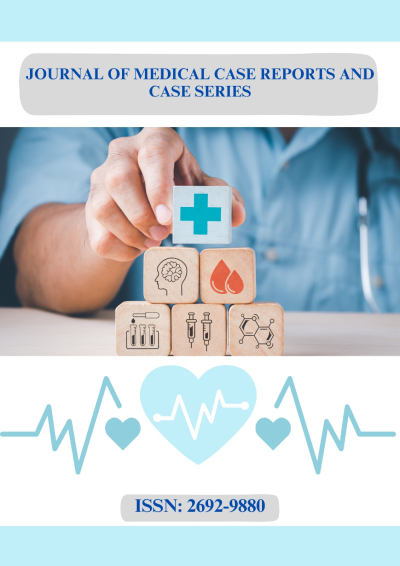Stalin C
Medical Advisor, Shield Healthcare Pvt Ltd., Chennai. India.
*Corresponding Author: Stalin C, Medical Advisor, Shield Healthcare Pvt Ltd., Chennai. India.
Abstract
Poor ovarian response (POR) refers to a condition in which a woman's ovaries do not produce enough good-quality eggs in response to ovarian stimulation during assisted reproductive techniques. These conditions are characterized by reduced ovarian reserve and decreased fertility potential. Despite advancements in reproductive medicine and assisted reproductive technologies, there is a significant group of patients for whom treatment remains challenging. Research on amino acids, reproductive health, and ovarian function is an ongoing area of study. Studies have explored the potential role of amino acids and their impact on reproductive outcomes. Leucine is an essential amino acid that plays a crucial role in protein synthesis and is known to activate the mTOR pathway, which is involved in cell growth, proliferation, and survival. The mTOR pathway, activated by Leucine, is associated with cellular processes that could be relevant to ovarian function.
Keywords: Poor ovarian response assisted reproductive technologies, Leucine.
Introduction
Poor ovarian response (POR) refers to a condition in which a woman's ovaries do not produce enough good-quality eggs in response to ovarian stimulation during assisted reproductive techniques (ART). These conditions are characterized by reduced ovarian reserve and decreased fertility potential. Despite advancements in reproductive medicine and assisted reproductive technologies (ART), there is a significant group of patients for whom treatment remains challenging.
There are several factors that can contribute to a poor ovarian response, including:[1].
1. Advanced Age: As women get older, their ovarian reserve decreases, and the quality and quantity of their eggs diminish. This can lead to a poor response to ovarian stimulation.
2. Ovarian Reserve: Some women may have lower ovarian reserve due to genetic factors or prior surgeries on the ovaries.
3. Medical Conditions: Certain medical conditions, such as polycystic ovarian syndrome (PCOS) or endometriosis, can impact ovarian response.
4. Previous Ovarian Surgery: Surgical procedures on the ovaries, such as ovarian cyst removal, may reduce ovarian reserve and response.
5. Environmental Factors: Exposure to environmental toxins and radiation can also affect ovarian function.
6. Lifestyle Factors: Smoking and excessive alcohol consumption can have a negative impact on ovarian response
7. Ovarian Stimulation Protocols: The choice of ovarian stimulation protocol in IVF can influence ovarian response. Individualized protocols may be needed for POR patients.
8. Hormonal Imbalances: Hormonal imbalances, such as high follicle-stimulating hormone (FSH) levels or low anti-Mullerian hormone (AMH) levels, can affect ovarian response. Addressing a poor ovarian response can be challenging, and success rates in achieving pregnancy through IVF may be lower in these cases.
Egg donation is often considered the most successful treatment for patients with POI, POF, or POR, as it bypasses the issues related to diminished ovarian function. Donor eggs can offer higher success rates in achieving a pregnancy. However, many patients may be initially hesitant or reluctant to choose this option due to various personal, emotional, or ethical reasons. Many patients who receive a diagnosis of these conditions may seek alternative solutions to preserve their biological connection to their child. The complex nature of these conditions and the multitude of potential causes contribute to the difficulty in finding one-size-fits-all solutions. This may lead them to explore various fertility treatments and interventions despite lower success rates. Fertility specialists can provide guidance and explore alternative treatments, which may include the use of different ovarian stimulation protocols, hormonal therapies, and experimental approaches, depending on the patient's unique situation.
Benefits Of Leucine For Poor Ovarian Responders Leucine, one of the essential amino acids, may have some potential benefits for women who are considered "poor ovarian responders." Leucine plays a vital role in the function of granulosa cells in the ovary. Granulosa cells are a type of somatic cell found in the ovarian follicles and are essential for folliculogenesis (the development of ovarian follicles) and oocyte maturation. Leucine's effects on granulosa cells are interconnected with its role in protein synthesis, energy metabolism, and signalling pathways.[2]
Here's how Leucine is beneficial:
1. Protein Synthesis: Leucine is a key regulator of protein synthesis, and it can influence the development and maturation of oocytes (egg cells). During the ovarian stimulation process in ART, improving the quality of the oocytes can lead to better outcomes. Leucine may support the development of high-quality oocytes by promoting protein synthesis within the developing follicles.[2]
2. Energy Metabolism: Leucine also contributes to energy metabolism, and the energy requirements of granulosa cells are high during folliculogenesis. Efficient energy production within granulosa cells is essential for supporting the growth and maturation of ovarian follicles and oocytes.[3]
3. mTOR Signalling: Leucine is involved in the activation of the mTOR (mammalian target of rapamycin) signalling pathway. The mTOR pathway plays a central role in regulating cell growth and protein synthesis, and it is also active in granulosa cells. Activation of mTOR signalling in granulosa cells is associated with the regulation of follicular development.[4]
4. Oocyte Quality: Since granulosa cells are intimately involved in supporting the development of the oocyte, any factor that affects granulosa cell function, such as Leucine, can indirectly influence oocyte quality. Better granulosa cell function can lead to improved oocyte quality, a critical factor for successful fertility and reproduction.[5]
Conclusion
Research on amino acids, reproductive health, and ovarian function is an ongoing area of study. Studies have explored the potential role of amino acids and their impact on reproductive outcomes. Leucine is an essential amino acid that plays a crucial role in protein synthesis and is known to activate the mTOR pathway, which is involved in cell growth, proliferation, and survival. The mTOR pathway, activated by Leucine, is associated with cellular processes that could be relevant to ovarian function. Few researchers have hypothesized that optimizing the nutritional and metabolic environment, including the intake of specific amino acids like Leucine, might have a positive impact on oocyte quality and ovarian response.
Conflict of Interest: None to declare.
Disclaimer: The views here expressed are personnel and does not represent the opinion of Shield Healthcare or its scientific committee /group or other regulatory agencies.
References
- Bai L, Pan H, Zhao Y, Chen Q, Xiang Y, et al. (2021) The Exploration of Poor Ovarian Response-Related Risk Factors: A Potential Role of Growth Differentiation Factor 8 in Predicting Ovarian Response in IVF-ET Patient. Front Endocrinol (Lausanne). 12: 708089.
- Garlick PJ (2005) The role of leucine in the regulation of protein metabolism. J Nutr. 135(6 Suppl):1553S-6S.
- Chand AL, Legge M (2011) Amino acid transport system L activity in developing mouse ovarian follicles. Human Reproduction. 26(11): 3102–3108.
- Son SM, Park SJ, Stamatakou E, Vicinanza M, Menzies FM, et al. (2020) Leucine regulates autophagy via acetylation of the mTORC1 component raptor. Nat Commun. 11: 3148.
- Cross PC, Brinster RL (1974) Leucine uptake and incorporation at three stages of mouse oocyte maturation. Experimental Cell Research. 86(1): 43–46.



